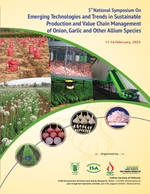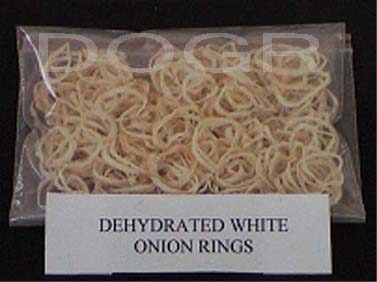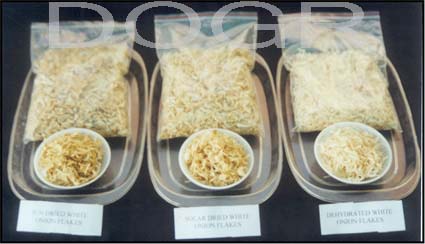Processing of onion
|
|
|
Onion can be processed into a wide variety of products. Minimally processed ready to use or ready to cook fresh onions, onion paste, dehydrated onion flakes, onion powder, onion oil, onion vinegar, onion sauce, pickled onion, onion wine and beverage etc. The demand for the processed products is increasing day by day due to its convenience to handle and use. As per the estimate, approximately 6.75% of the onion produced is going for processing (by counting total losses, consumption, export and bulb seed requirement the remaining percentage is considered for processing).
(1) Minimally processed onions: These are peeled and/or cut onions for ready to use that retain its freshness, packed in suitable packaging material and stored at refrigerated conditions or frozen conditions.
(2) Onion paste: Onion is grounded yet retaining its freshness. Preparation of minimally processed onions and onion paste entails optimization of proper preservatives and packaging materials to increase the shelf life of these products.
(3) Dehydrated onions: Dehydration of onions reduces the bulk to transport and also increases the shelf life of onions significantly due to less moisture, which arrests the growth of microorganism. Dehydrated onion flakes can be processed into onion powder by proper grinding. Onion powder dissolves very easily and reconstitute quickly compared to onion flakes. Onion powder incorporates the flavour of onion in a variety of foods. Use of suitable packaging techniques is the most important to increase the shelf life of dehydrated onion flakes and powder as these are very hygroscopic in nature.
(4) Pickles: An age old practice to preserve the onions is by means of a process called pickling. Most widely used pickling for onions are vinegar based pickling and oil based pickling. While vinegar based pickling is popular in the United States and Europe, oil based pickling is widely adopted in Asia and Africa.
(5) Oil: It is another flavouring substance which is widely used in the seasonings of processed products. Onion oil is also used as a natural food preservative in some food products. Onion oil can be extracted by different methods like distillation, solvent extraction, super critical fluid extraction etc.
(6) Vinegar/Beverage/Sauce: As the onions are rich in sugars and other nutrients they can be processed into onion vinegar and onion wine. Onion can also be processed into onion beverage and onion sauce.
Onion waste processing
Large amount of onion waste is produced by consumption of onion both domestically and industrially, making it necessary to search for their utilization. The main onion waste include onion skins, two outer fleshy scales and roots generated during industrial peeling and undersized malformed or damaged bulbs. These can be used in different ways.
(1) Source of fiber: The skin of an onion bulb was found to be a rich fibre. After harnessing the color from the dry skin by decoloration, the resultant product is converted into a fibrous material which can be used as a fiber supplement. The same fibrous material can be used as a thickening agent and an exemplary use is in making soup.
(2) Natural colour: The color extracted from onion skin can be used as a natural dye. The dry skin of onion is found to contain flavonoids. Onion essence which is used as a flavoring agent can also be extracted from the skin of an onion bulb.
(3) Bio-gas: Other resultant materials like outer layers, roots and stalks can be anaerobically digested in a bio-digester to produce alternative energy sources like bio-gas.
DOGR has recently started some work on developing processed products like onion flakes and minimally processed garlic, when standardized these will be added here

















